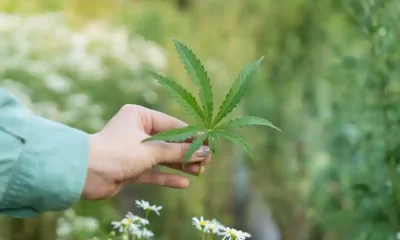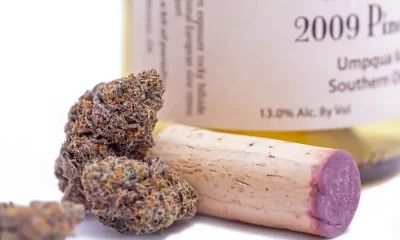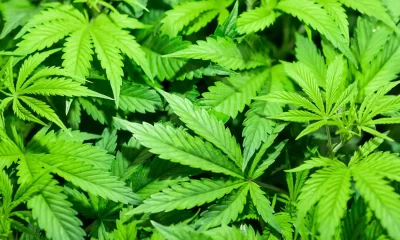Business
Seven Founding Fathers Who Farmed Hemp and Advocated for It

America is built on a foundation of hemp advocacy, since the beginning.
On July 4, 1776—247 years ago—the Second Continental Congress unanimously adopted the Declaration of Independence, announcing the colonies’ separation from Great Britain. Many of them not only grew hemp but insisted how important the plant is to the foundation of American agriculture. Sorting through rumors about the Founding Fathers and hemp is another story, with invented quotes and misinformation.
The Declaration’s blanket assertion, “all Men are created equal,” should be taken with a grain of salt given that many Founding Fathers owned slaves, and Thomas Jefferson’s and Henry Clay’s slaves also grew hemp. It would take a lot longer for actual equal rights to materialize.
In colonial times, hemp was an acceptable form of tax payment for over 150 years. Here’s the top Founding Fathers who farmed, milled, processed, or advocated for hemp.

George Washington
MountVernon.org, George Washington’s estate, admits he grew hemp extensively and compared it to tobacco. “Throughout his lifetime, George Washington cultivated hemp at Mount Vernon for industrial uses,” Mount Vernon writes. “The fibers from hemp held excellent properties for making rope and sail canvas. In addition, hemp fibers could be spun into thread for clothing or, as indicated in Mount Vernon records, used in repairing the large seine nets Washington used in his fishing operation along the Potomac.”
Nearly half a million Americans die annually from tobacco-related illness, but to think that it could have been avoided if Washington had his way is powerful. “At one point in the 1760’s Washington considered whether hemp would be a more lucrative cash crop than tobacco but determined wheat was a better alternative.” Today scholars can sift through George Washington’s detailed grow log.

Thomas Jefferson
Jefferson’s hemp crops were massive, and he enlisted slaves to grow it. “Enslaved laborers cultivated hemp both at Monticello and Poplar Forest, Jefferson’s plantation in Bedford County, Virginia,” Jefferson’s estate Monticello.org writes. Jefferson once used 48 pounds of hemp to make clothing for child slaves.
Jefferson’s massive plantation could yield up to 150 pounds in one day: “A hand can tend 3 acres of hemp a year,” Jefferson’s journal reads. Tolerable ground yields 500. lb to the acre. You may generally count on 100 lb for every foot the hemp is over 4 f. high. A hand will break 60 or 70 lb a day, and even to 150 lb.” You can read page 95 of his hemp journal in his own handwriting here.
American-made threshing machines, invented around the time of the Declaration, were used for hemp and were a symbol of power over Great Britain’s dominance.

Thomas Paine
Thomas Paine’s Common Sense spurred the revolution and it had the largest sale and circulation of any book published in American history when it was published in 1775. It convinced colonists that they were being exploited by the Crown. “In almost every article of defence we abound,” the pamphlet reads. “Hemp flourishes even to rankness, so that we need not want cordage.” The latter line stirred up speculations, but “rankness” apparently means “fruitfulness” i.e. ensuring that the colonists would not run out of hemp rope.

Benjamin Franklin
Benjamin Franklin owned a hemp-paper mill and published content about hemp’s medical properties. Franklin published the Pennsylvania Gazette, and in it excerpted Ephraim Chambers’ Universal Dictionary, writing that hemp is “of great Use in the Arts and Manufactories,” and that “The Seed is said to have the Faculty of abating Venereal Desires; and its Decoction in Milk, is recommended against the Jaundice.” You can see the original edition here.
Like Washington, Franklin also had a change of heart on the issue of slavery, and was the first president of an abolitionist society, however little changed during his lifetime on the embedded institution of slavery.

Alexander Hamilton
Alexander Hamilton, America’s first Secretary of the Treasury, oversaw hemp imports in the States, and once imposed a 5% tax on hemp imports in 1790. “… All other goods imported from Foreign Countries shall be liable to a duty of 5 per Cent ad-Valorem, excepting certain articles deemed of importance to Manufactures, among which Hemp is not,” Hamilton wrote on May 21, 1790. “It is therefore certain, that a Duty of five per Cent accrues on the importation of Hemp into the United States from any Foreign Country.”

Henry Clay
Clay ran unsuccessfully for presidency three times, which is why his name is mentioned less often. Clay was also very enthusiastic about hemp and forced his slaves to farm it. “Hemp was Henry Clay’s most lucrative cash crop at Ashland,” HenryClay.org writes. “Men enslaved by Clay grew thousands of pounds of hemp and manufactured it into rope and bagging for the cotton industry. Clay was interested in experimentation and pursued many new innovations in equipment and hemp varieties.”

James Madison
James Madison, America’s fourth President and “Father of the Constitution,” was also reportedly a hemp farmer and claimed that hemp gave him the insight to create a new democratic nation. Launched in 2015 by faculty from the Departments of Biology and Engineering, James Madison University’s Industrial Hemp Research Program coordinates university expertise toward laboratory research.
Source: https://hightimes.com/culture/seven-founding-fathers-who-farmed-hemp-and-advocated-for-it/
Business
New Mexico cannabis operator fined, loses license for alleged BioTrack fraud

New Mexico regulators fined a cannabis operator nearly $300,000 and revoked its license after the company allegedly created fake reports in the state’s traceability software.
The New Mexico Cannabis Control Division (CCD) accused marijuana manufacturer and retailer Golden Roots of 11 violations, according to Albuquerque Business First.
Golden Roots operates the The Cannabis Revolution Dispensary.
The majority of the violations are related to the Albuquerque company’s improper use of BioTrack, which has been New Mexico’s track-and-trace vendor since 2015.
The CCD alleges Golden Roots reported marijuana production only two months after it had received its vertically integrated license, according to Albuquerque Business First.
Because cannabis takes longer than two months to be cultivated, the CCD was suspicious of the report.
After inspecting the company’s premises, the CCD alleged Golden Roots reported cultivation, transportation and sales in BioTrack but wasn’t able to provide officers who inspected the site evidence that the operator was cultivating cannabis.
In April, the CCD revoked Golden Roots’ license and issued a $10,000 fine, according to the news outlet.
The company requested a hearing, which the regulator scheduled for Sept. 1.
At the hearing, the CCD testified that the company’s dried-cannabis weights in BioTrack were suspicious because they didn’t seem to accurately reflect how much weight marijuana loses as it dries.
Company employees also poorly accounted for why they were making adjustments in the system of up to 24 pounds of cannabis, making comments such as “bad” or “mistake” in the software, Albuquerque Business First reported.
Golden Roots was fined $298,972.05 – the amount regulators allege the company made selling products that weren’t properly accounted for in BioTrack.
The CCD has been cracking down on cannabis operators accused of selling products procured from out-of-state or not grown legally:
- Regulators alleged in August that Albuquerque dispensary Sawmill Sweet Leaf sold out-of-state products and didn’t have a license for extraction.
- Paradise Exotics Distro lost its license in July after regulators alleged the company sold products made in California.
Golden Roots was the first alleged rulebreaker in New Mexico to be asked to pay a large fine.
Source: https://mjbizdaily.com/new-mexico-cannabis-operator-fined-loses-license-for-alleged-biotrack-fraud/
Business
Marijuana companies suing US attorney general in federal prohibition challenge

Four marijuana companies, including a multistate operator, have filed a lawsuit against U.S. Attorney General Merrick Garland in which they allege the federal MJ prohibition under the Controlled Substances Act is no longer constitutional.
According to the complaint, filed Thursday in U.S. District Court in Massachusetts, retailer Canna Provisions, Treevit delivery service CEO Gyasi Sellers, cultivator Wiseacre Farm and MSO Verano Holdings Corp. are all harmed by “the federal government’s unconstitutional ban on cultivating, manufacturing, distributing, or possessing intrastate marijuana.”
Verano is headquartered in Chicago but has operations in Massachusetts; the other three operators are based in Massachusetts.
The lawsuit seeks a ruling that the “Controlled Substances Act is unconstitutional as applied to the intrastate cultivation, manufacture, possession, and distribution of marijuana pursuant to state law.”
The companies want the case to go before the U.S. Supreme Court.
They hired prominent law firm Boies Schiller Flexner to represent them.
The New York-based firm’s principal is David Boies, whose former clients include Microsoft, former presidential candidate Al Gore and Elizabeth Holmes’ disgraced startup Theranos.
Similar challenges to the federal Controlled Substances Act (CSA) have failed.
One such challenge led to a landmark Supreme Court decision in 2005.
In Gonzalez vs. Raich, the highest court in the United States ruled in a 6-3 decision that the commerce clause of the U.S. Constitution gave Congress the power to outlaw marijuana federally, even though state laws allow the cultivation and sale of cannabis.
In the 18 years since that ruling, 23 states and the District of Columbia have legalized adult-use marijuana and the federal government has allowed a multibillion-dollar cannabis industry to thrive.
Since both Congress and the U.S. Department of Justice, currently headed by Garland, have declined to intervene in state-licensed marijuana markets, the key facts that led to the Supreme Court’s 2005 ruling “no longer apply,” Boies said in a statement Thursday.
“The Supreme Court has since made clear that the federal government lacks the authority to regulate purely intrastate commerce,” Boies said.
“Moreover, the facts on which those precedents are based are no longer true.”
Verano President Darren Weiss said in a statement the company is “prepared to bring this case all the way to the Supreme Court in order to align federal law with how Congress has acted for years.”
While the Biden administration’s push to reschedule marijuana would help solve marijuana operators’ federal tax woes, neither rescheduling nor modest Congressional reforms such as the SAFER Banking Act “solve the fundamental issue,” Weiss added.
“The application of the CSA to lawful state-run cannabis business is an unconstitutional overreach on state sovereignty that has led to decades of harm, failed businesses, lost jobs, and unsafe working conditions.”
Business
Alabama to make another attempt Dec. 1 to award medical cannabis licenses

Alabama regulators are targeting Dec. 1 to award the first batch of medical cannabis business licenses after the agency’s first two attempts were scrapped because of scoring errors and litigation.
The first licenses will be awarded to individual cultivators, delivery providers, processors, dispensaries and state testing labs, according to the Alabama Medical Cannabis Commission (AMCC).
Then, on Dec. 12, the AMCC will award licenses for vertically integrated operations, a designation set primarily for multistate operators.
Licenses are expected to be handed out 28 days after they have been awarded, so MMJ production could begin in early January, according to the Alabama Daily News.
That means MMJ products could be available for patients around early March, an AMCC spokesperson told the media outlet.
Regulators initially awarded 21 business licenses in June, only to void them after applicants alleged inconsistencies with how the applications were scored.
Then, in August, the state awarded 24 different licenses – 19 went to June recipients – only to reverse themselves again and scratch those licenses after spurned applicants filed lawsuits.
A state judge dismissed a lawsuit filed by Chicago-based MSO Verano Holdings Corp., but another lawsuit is pending.
Source: https://mjbizdaily.com/alabama-plans-to-award-medical-cannabis-licenses-dec-1/
-

 Business2 years ago
Business2 years agoPot Odor Does Not Justify Probable Cause for Vehicle Searches, Minnesota Court Affirms
-

 Business2 years ago
Business2 years agoNew Mexico cannabis operator fined, loses license for alleged BioTrack fraud
-

 Business2 years ago
Business2 years agoAlabama to make another attempt Dec. 1 to award medical cannabis licenses
-

 Business2 years ago
Business2 years agoWashington State Pays Out $9.4 Million in Refunds Relating to Drug Convictions
-

 Business2 years ago
Business2 years agoMarijuana companies suing US attorney general in federal prohibition challenge
-

 Business2 years ago
Business2 years agoLegal Marijuana Handed A Nothing Burger From NY State
-

 Business2 years ago
Business2 years agoCan Cannabis Help Seasonal Depression
-

 Blogs2 years ago
Blogs2 years agoCannabis Art Is Flourishing On Etsy













